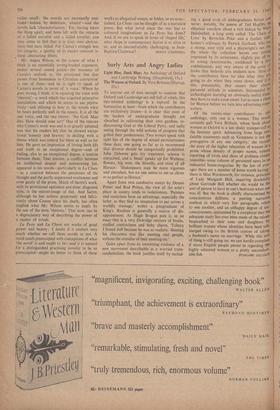Surly Arts and Angry Ladies
Light Blue, Dark Blue: An Anthology of Oxford To anyone out of date enough to suppose that Oxford and Cambridge arc still full of rebels, this tidy-minded anthology is a reproof. In the humanities at least—from which the contributors are exclusively drawn--it is clear that most of the leaders of undergraduate thought are absorbed in cultivating their own gardens, re- discovering God or the Liberal Party, and sadly seeing through the wild notions of progress that gulled their predecessors. Two writers speak with tight lips of the degree of sexual permissiveness these days, one going so far as to recommend that divorce should be categorically prohibited. John Osborne gets icy treatment, science is ostracised, and a Jesuit speaks up for Watteau, flowers, big trees, the Sitwells, and most of all Horace: 'Shakespeare may be more vigorous and abundant, but no one seems to me so clever or so perfect as Horace.'
Apart from two combative essays by Dennis Potter and Rod Prince, the view of the arist's place in society tends to isolationism. 'Painters and musicians have an advantage, especially the latter, as they find no temptation to put across a worldly message,' writes a postgraduate of King's. Realism is generally a source of dis- appointment. As Hugh Brogan puts it, in an essay that is a very Oxbridge mixture of brains, studied contrariness and baby charm, Tolstoy I found dull because he was so realistic. Meeting his characters was like meeting real people, without the stimulus of their meeting me.'
Quite apart from its interesting evidence of a new movement describable as a worried trans- cendentalism, the book justifies itself by includ- ing a good crop of undergraduate fiction and verse: notably, the poems of Ted Hughes, all elliptical anecdote about a rich Indian by Warts
Habibullah, a long story called 'The Chain of Love' by Reynolds Price and a funfair stall keeper's soliloquy by Patrick Garland, who bas a strong, easy style and a playwright's car. on the whole the collection leaves one feeling impressed by its seriousness, slightly put bY young reactionaries, maddened by a fevic exhibitionists, and very aware of the sense 01, limbo that bedevils arts students now. Most 04 the contributors have no idea what they arc going to do when they come down, and it Is this, presumably, that causes their almost paranoid attitude to scientists. Surrounded bY I technologists learning an obviously useful trade, they have to make some retort. Let us raise a cheer for Horace before we turn into advertising coPY• writers.
Of the twenty-nine contributors to this, anthology, only one is a woman. This woulo certainly gall Vera Brittain, whose book about women at Oxford is a last shaky trumpet-call to the feminist spirit. Advancing from large irre. futable statements such as 'Greatness is not the prerogative of any one category,' she records the story of the higher education of women in 3 prose whose density of proper names, solemn reporting of trivia and shots of archness closelY resembles some column of personnel news in au industrial house-magazine. By the law of aver- ages there are a number of items worth having: there is Miss Wordsworth, for instance, principal of Lady Margaret Hall, inquiring doubtfullY about Gertrude Bell whether she would be the sort of person to have in one's bedroom when one was ill. But the book is chiefly characterised bY conscientious dullness, a panting narrative method in which very few paragraphs relate to one another, and an unhappy degree of sex' consciousness, epitomised by a complaint that '0° adequate study has ever been made of the talents bequeathed to their sons and daughters bY brilliant women whose identities have been sub- merged owing to the British custom of taking a husband's name on marriage.' While this sort of thing is still going on, we can hardly complain if many English people persist in regarding the highly educated woman as a pretty uncomfort-


































 Previous page
Previous page